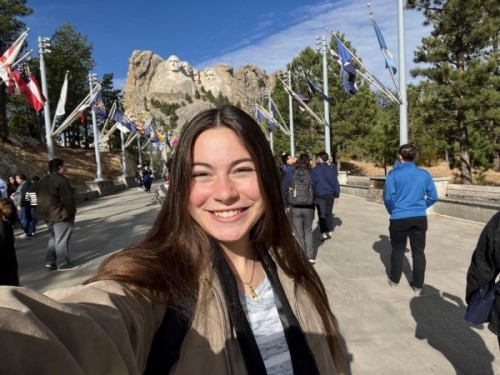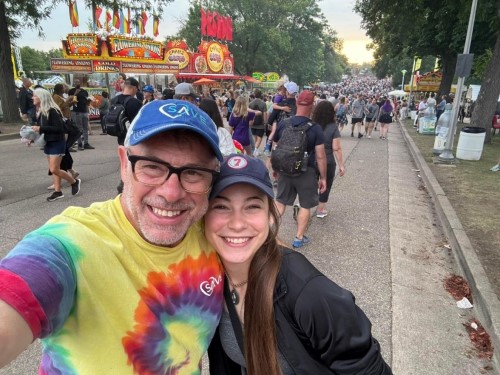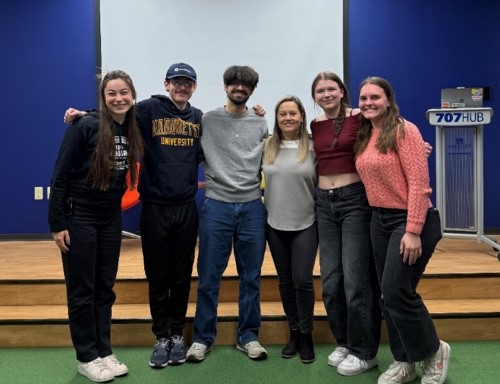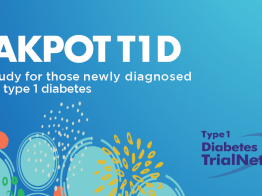
Meet Maisie Mische: Turning a T1D diagnosis into opportunities
When Maisie Mische, a 22-year-old mechanical engineering student at Marquette University, started having trouble with her vision last year, she attributed the problem to eye fatigue from late-night studying. But two episodes of double vision and subsequent tests revealed something more complex: type 1 diabetes (T1D).

Representing Marquette’s Chapter of Tau Beta Pi (Engineering Honor Society) at National Convention in Rapid City, SD.
While adjusting to her new diagnosis, Maisie returned home to her parents in Minnesota, where she attended school virtually for a week. "It was so unexpected," says Maisie, who has no family history of T1D. "It definitely required a major life adjustment."
A few weeks after her diagnosis, Maisie saw an endocrinologist at the Mayo Clinic who suggested she consider participating in TrialNet’s JAKPOT T1D Study.
"Since I was newly diagnosed, JAKPOT T1D looked like a viable option for me, particularly since there was a location at the University of Minnesota, close to my parents’ home,” Maisie said. “Talking to the research team and understanding everything involved really reassured me that the study was a good match for me."
Maisie says another important factor in her decision was the need for participants for T1D research.
“There’s a small window for enrollment (100 days from diagnosis) in the JAKPOT study,” explains Maisie. “And researchers really need people like me to be able to make advances in type 1 diabetes research.”
JAKPOT T1D is investigating two different Janus kinase (JAK) inhibitors—abrocitinib and ritlecitinib—to determine if either or both can preserve insulin production in people (ages 12-35) recently diagnosed with T1D. As a study participant, Maisie takes a daily pill—either a JAK inhibitor or a placebo—and makes quarterly visits to the University of Minnesota for health tests and monitoring. The University of Minnesota is one of 18 TrialNet Clinical Centers at the forefront of type 1 diabetes research.
Maisie says she’s been impressed with the University of Minnesota research team.
"Everyone I’ve dealt with has been amazing,” she said. “My study visits are usually scheduled early in the morning after fasting for 10 hours. And the study team is always cheerful and energetic. The visits are very manageable. I get an IV in my arm for a mixed meal tolerance test and spend two hours scrolling on my phone or watching Netflix while they draw my blood. The researchers really prioritize making the study accessible, easy, and comfortable for participants."
Posing with Cody (a Diabuddy from Type One Together) at my first “diaversary” party.
One year after her diagnosis, Maisie says she feels more confident managing her T1D. "I started using an insulin pump right before the school year began, and that's really simplified my daily life."

Celebrating my first day using an insulin pump with my dad at the Minnesota State Fair.
She’s also part of a newly formed T1D community at Marquette University.
"One of my best friends at college has type 1 diabetes and had been wanting to start a group on campus for people with type 1. My diagnosis motivated him to get the process started, and as of September, we have The Diabetes Link (formerly The College Diabetes Network) on campus. It's a community for individuals with type 1 diabetes and those who want to support them.”

Members of The Diabetes Link after a meeting and guest speaker session about exercise and Type 1 Diabetes.
To anyone recently diagnosed with T1D, Maisie says, “I just want people to know that being part of the JAKPOT Study is not a huge burden or obstacle. It's very easy to do and it’s such important work.”
To learn more about the JAKPOT T1D Study, visit http://trialnet.org/jakpot.







